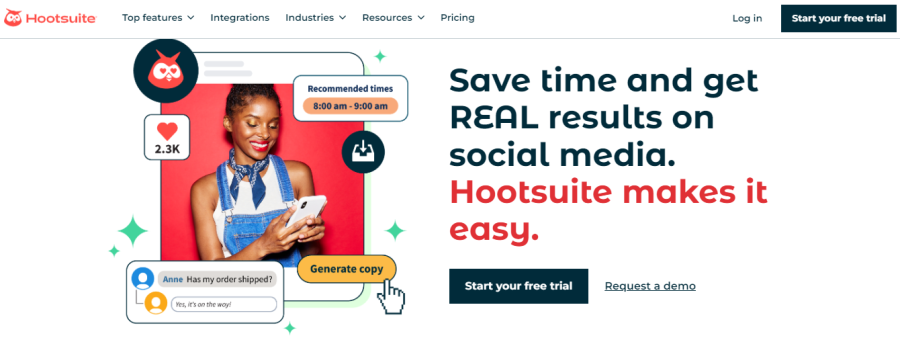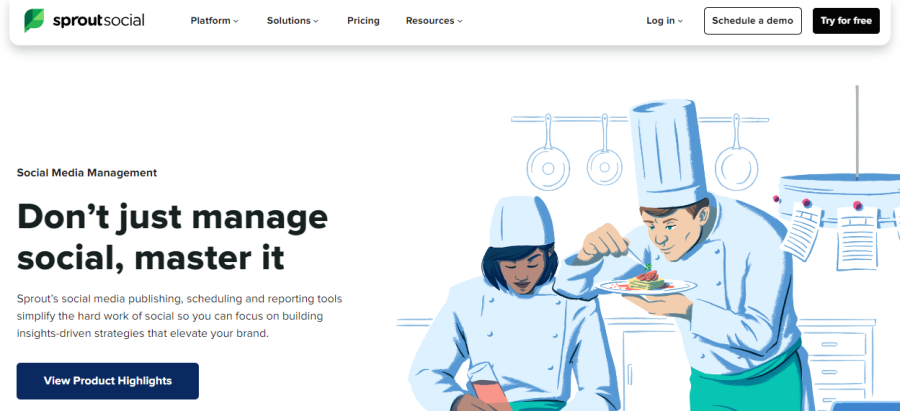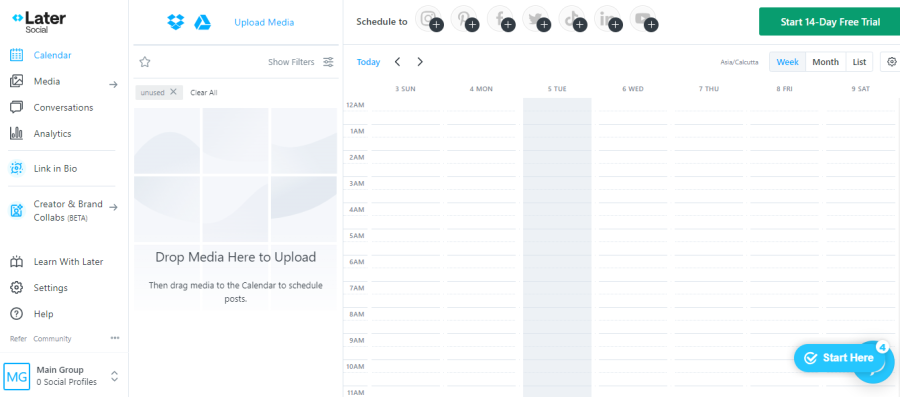Diving into the world of social media in 2024, we’re immersed in an ecosystem teeming with opportunities and challenges, intensified by the pivotal role of social media management tools. With over 2.93 billion monthly active users on Facebook and an Instagram audience that actively engages with Reels, the digital landscape is more dynamic than ever.
Social media transcends mere profile updates, evolving into a strategic arena where engagement, analytics, and the management of multiple channels are executed with precision, thanks to sophisticated social media management tools. The integration of AI-driven analytics and marketing platforms through these tools underscores the critical need for personalized engagement strategies.
The challenge and opportunity for brands lie in judiciously prioritizing efforts across platforms, which is where social media management tools become indispensable. Given the average user’s engagement across seven different platforms each month, the digital space is fiercely competitive. Insights from Hootsuite’s Digital Trends Report illuminate a trend towards the strategic selection of platforms based on ROI, facilitated by social media management tools, with 52% of organizations citing concerns about the ROI implications of spreading too thin across multiple networks.
Moreover, engagement metrics revealed through social media management tools point towards a shift in content consumption preferences. The demand for entertainment and genuine connection supersedes tolerance for self-promotion, with 34% of consumers deterred by excessive self-promotion on social platforms.
This gap between brand messaging and consumer preferences underscores the imperative for brands to adapt, using social media management tools to focus on content that entertains, educates, and engages, aligning closely with the personal interests and behaviors of their audience.
Why Use Social Media Management Tools?
The digital age has bestowed upon us the gift of connectivity, with social media at its core. But with great power comes great responsibility – the responsibility to manage multiple platforms, analyze performance data, engage with your audience, and schedule content efficiently.
Here’s where social media management tools shine:
1. Time-Saving Efficiency: Automate scheduling, track engagements, and manage your content calendar across platforms from a single dashboard.
2. Analytics and Insights: Dive deep into performance metrics to understand what resonates with your audience, helping you refine your strategy in real-time.
3. Enhanced Engagement: Leverage tools to listen to conversations about your brand, respond to feedback promptly, and engage with your community in meaningful ways.
4. Cost-Effectiveness: By streamlining these processes, you save on resources and time, allowing you to focus on strategy and creativity.
Emerging Trends in Social Media Management
As we step into 2024, a few trends are shaping the future of social media management:
- AI and Machine Learning: Tools are becoming smarter, offering predictive analytics and automated content optimization to maximize engagement.
- Integrated Marketing Communications: Platforms that offer seamless integration with CRM, email marketing, and other digital channels are leading the pack, providing a holistic view of customer interactions.
- Focus on ROI: With the growing demand for measurable results, tools that offer detailed analytics on conversion rates and the direct impact of social media activities on sales are becoming indispensable.
Research and Select the Social Media Management Tool
In selecting the best social media management tools for 2024, we considered a variety of factors: ease of use, innovative features, integration capabilities, customer support, and, importantly, user feedback. Our comprehensive research includes industry favorites like Hootsuite and Buffer, alongside rising stars that bring unique value to the table.
1. Hootsuite

Key Features: Hootsuite remains a titan in the realm of social media management for its comprehensive dashboard that allows users to monitor multiple streams in one place, schedule posts across different platforms, and analyze performance data.
- Pros: Its ability to integrate with over 35 social networks and provide detailed analytics makes it a go-to for marketers seeking a robust, all-in-one solution.
- Cons: Some users find the interface a bit overwhelming due to the sheer volume of features.
Unique Selling Proposition: The platform’s advanced analytics tools stand out, offering detailed reports that help marketers measure their social ROI effectively.
Pricing: The pricing details for Hootsuite are based on annual billing and don’t include applicable taxes.
- Professional Plan: $99/month for 1 user and 10 social accounts.
- Team Plan: $249/month for 3 users and 20 social accounts.
- Business Plan: Starts at $739/month for 5 users and 35 social accounts.
- Enterprise Plan: Custom pricing for unlimited users and 50+ social accounts.
2. Buffer

Key Features: Buffer is renowned for its simplicity and effectiveness in scheduling posts, analyzing performance, and managing accounts across multiple social media platforms with an intuitive interface.
- Pros: Its user-friendly design is ideal for individuals and small businesses looking for straightforward social media management without overwhelming features.
- Cons: Buffer’s simplicity comes at the cost of lacking some advanced analytics and integration capabilities found in more comprehensive tools.
Unique Selling Proposition: Buffer stands out for its ease of use and streamlined approach to social media scheduling and analytics, making it accessible for beginners and efficient for seasoned marketers.
Pricing: These plans cater to different user needs, from individual users to larger teams and agencies, with varying levels of access to Buffer’s publishing, analytics, and engagement tools.
- Free Plan: $0 per channel, allowing up to 3 channels with basic scheduling features.
- Essentials Plan: $6/month per channel.
- Team Plan: $12/month per channel.
- Agency Plan: $120/month for 10 channels.
3. Sprout Social

Key Features: Sprout Social excels in deep analytics, social listening tools, and fostering meaningful engagement, offering a suite of comprehensive features for advanced social media management.
- Pros: Offers detailed insights into audience demographics and engagement patterns, with robust reporting features for data-driven decision-making.
- Cons: Its premium capabilities come with a higher price point, which may be a barrier for smaller businesses or individual practitioners.
Unique Selling Proposition: Sprout Social’s strength lies in its sophisticated analytics and social listening capabilities, helping businesses to stay ahead of trends and deeply understand their audience.
Pricing: Sprout Social offers several plans:
- Standard Plan: $249 per month, 5 social profiles and various features like an all-in-one social inbox and social content calendar.
- Professional Plan: $399 per month with unlimited social profiles
- Advanced Plan: $499 per month, each offering additional features and capabilities. They also offer custom pricing for Enterprise solutions.
4. Later

Key Features: Specializing in visual content scheduling, Later is a favorite for managing Instagram and Pinterest content, with features like a visual content calendar and analytics.
- Pros: Exceptional for planning and scheduling visual content with a drag-and-drop interface, making it easy to design aesthetically cohesive feeds.
- Cons: Its focus on visual platforms means it might not offer the comprehensive cross-platform functionality required by some businesses.
Unique Selling Proposition: Later’s visual planning tools and content scheduling capabilities make it unparalleled for brands focusing on image-heavy platforms like Instagram and Pinterest.
Pricing: Later offers several plans:
- Starter plan at $16.67/month, a Growth plan at $30/month, and an Advanced plan at $53.33/month, all billed yearly. They also offer a free plan with limited features
Define the Audience and Purpose
This guide is crafted with a clear audience in mind: social media managers, digital marketers, and business owners navigating the vast ocean of online engagement. Whether you’re a small business looking to carve your niche or a seasoned marketer aiming to streamline your processes, this post is your beacon. Our goal? To arm you with insights, comparisons, and real-world success stories that guide you to the tool that not just fits your needs but elevates your social media strategy to new heights.
The future of social media management is heavily influenced by AI, with the AI in the social media market projected to grow from USD 2.10 billion in 2024 to USD 7.25 billion by 2029, at a CAGR of 28.04%. This growth is driven by the increasing integration of AI with social media for effective advertising, customer engagement, and competitive advantages.
As we look ahead, the data-driven nature of AI in social media management cannot be understated. AI algorithms process billions of data points daily, offering invaluable insights into consumer behaviors, content performance, and market trends.
For instance, AI analyzes user interactions to predict the best times for posting content, increasing engagement rates by up to 73%. Moreover, businesses using AI-powered chatbots have seen a 35% reduction in customer service costs. These statistics showcase the tangible impact of AI on social media management, from enhancing content strategies to optimizing customer interactions. It’s evident that AI’s data-driven approach is shaping the future of digital marketing.
For example, e-commerce companies utilize AI for personalized product recommendations on social media, while banking institutions deploy chatbots with AI interfaces for customer service. Additionally, AI’s capability to gather data from social media platforms has been instrumental in applications like predicting disease spread and enhancing customer intelligence data.

